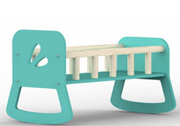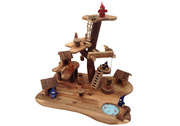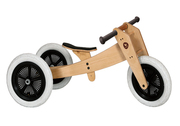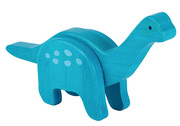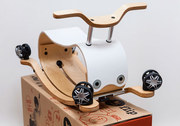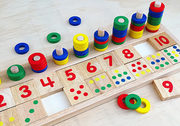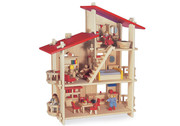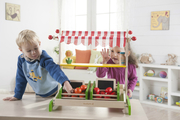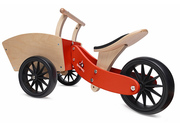 Loading... Please wait...
Loading... Please wait...- Home
- Gift Guide
Gift Guide
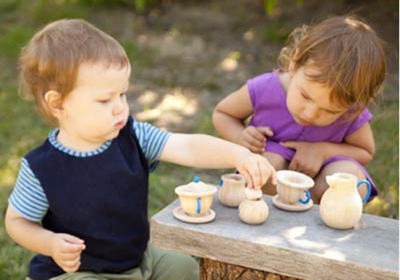
Children love to play. Play is the ‘work’ of children. It is how they express themselves – their ideas about the world, their emotions, their interests and motivations. Great toys support this ‘work,’ by fostering creativity, imagination and learning.
This guide has been developed to help you choose great toys to support your child’s play. The benefit of choosing a toy or gift from Eco Toys is the peace of mind that it is safe for the child and kind to the environment.
When choosing toys or gifts for children it is helpful to first consider their age, development and interests. This guide suggests toys that are most commonly suitable for children in the given age range. Toys which are of interest to the child and which are appropriate to their level of development result in longer periods of concentration and richer play experiences as children do not become bored or overly frustrated.
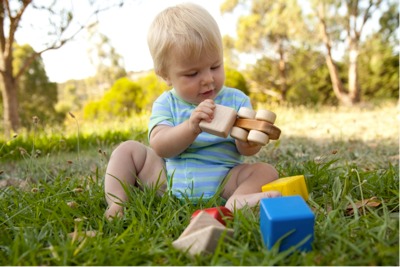
Babies (birth to 1 year)
During the first year of development, toys and experiences that stimulate the senses are essential to the developing brain. Babies like to look, listen, feel, smell and taste their toys so elements of texture, colour and sound are important. As Eco Toys are made from natural and non-toxic materials they are perfect for babies within this sensory stage of exploration. Toys that reward a baby’s actions are also pleasing to this age group, they love seeing and hearing the balls fall as they shake a rainstick tower or crawling after it as it rolls along the ground.
Rattles and shakers offer opportunity for sensory exploration and reward the baby with sound as a result of their movements.
Organic cotton & wooden teething toys are designed to be safe for a baby to chew and bite down on and assist to alleviate the gum discomfort they feel.
Books are wonderful gifts for babies as they are born eager to absorb the language they hear all around them. Initially babies will grab at books and try to eat them but persevering with reading regularly to them will encourage a love of books, reading and language. If your baby is at the grab and eat stage, try a beautiful Eco Toys cloth book to begin with. Look for simple stories and bold, bright illustrations.
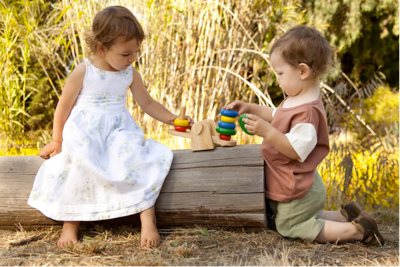
Toddlers (1-3 years)
The primary way that older babies and toddlers learn is through their own exploration of objects and environments. These children enjoy toys that provide for exploration with their hands – nesting, stacking, building and knocking down, sorting, banging and hammering.
Physical development of larger muscles is also key with standing, walking, running, kicking, jumping and climbing all skills to master and our walkers are a great way to encourage this.
During toddlerhood elements of pretend play also emerge with children imitating adult behaviour in their play. Toys that introduce shapes, numbers and letters in fun, hands on ways are excellent tools for learning.
Simple building and construction toys cater to the child’s developmental need to explore with their hands.
Attractive, safely constructed dolls are a wonderful way of extending the toddler’s pretend play experiences.
Well constructed walkers work to assist and guide the toddler as they learn to stand and walk.
Shape sorters offer many opportunities for learning as toddlers match the correct shapes and manipulate each shape into place. They are also excellent ways to introduce learning about colour, shape and counting.
Toddlers love playing with toys requiring a push and pull action.
Trucks, trains and ride-on toys are simply fascinating to their developing brains.
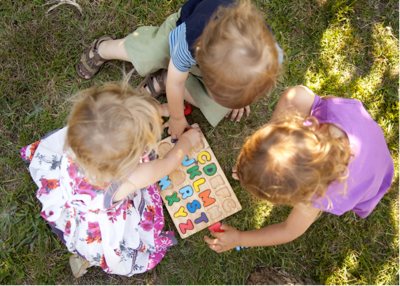
Preschool (3-5 years)
The preschooler learns by observing and imitating adults and through adult instruction and explanation. Role play continues to be an important way for children of this age to make sense of their world. Simple games reinforce the social elements of turn taking and cooperation, as well as thinking skills. Preschoolers are much more confident physically and enjoy the challenges of manipulative toys such as construction sets, more complex puzzles.
Most preschoolers love exploring creative materials and are becoming more skilled at drawing and painting recognisable objects and enjoy the challenge of learning to cut with scissors.
Building and construction sets are wonderful toys due to their open ended nature. As well as developing fine motor skills, children using these materials are also imagining as their constructions evolve and problem solving as they face various building challenges.
Jigsaw puzzles offer an opportunity for children to learn to problem solve through trial and error and perseverance. Preschoolers love the opportunity to demonstrate mastery once they have learnt to complete a puzzle and will be drawn to repeat the experience again and again.
Preschoolers love role play and dressing up. Research suggests that children who engage in this type of imaginative play are measurably happier, have richer verbal skills and are less physically aggressive.
As children use manipulative toys they are developing arm steadiness, arm and hand precision, finger and hand dexterity and hand-eye coordination.
Balls are for great for encouraging physical active play – throwing, catching, bouncing and kicking.
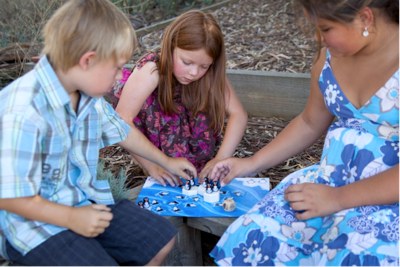
School age (6 years+)
The personalities and interests of each individual child become much more pronounced during the school years. Parents will continue to see a marked increase in concentration span as their children develop through the school years. This development means that suitable toys, games and books will offer higher levels of complexity and opportunities for engagement by the child.
It is important that parents look for toys and experiences that encourage both the development of intellectual skills (thinking, reasoning, literacy, mathematical) and creative and social skills.
Well designed games encourage children to develop thinking and co-operative skills as they come to understand and negotiate the rules of play.
Construction and building toys offer an open ended play experience for school age children that allows them to respond appropriate to their level of concentration and development. They also develop visual-spatial relationships and reinforce mathematical understandings.
Imaginative, role play continues to be important for children in the early years of school and is important for learning to manage emotions and to the development of socially appropriate behaviour.
Art materials provide the child with an outlet to express their own ideas and emotions, their creativity and individuality.
Please remember: All children develop at their own pace and reach developmental milestones at different times. The stages mentioned in this web site are meant as approximate guidelines only.
This guide was compiled by Christie Burnett who has a Bachelor of Education (Early Childhood).
NEWSLETTER
Join our newsletter to receive exclusive deals, news and eco tips!

